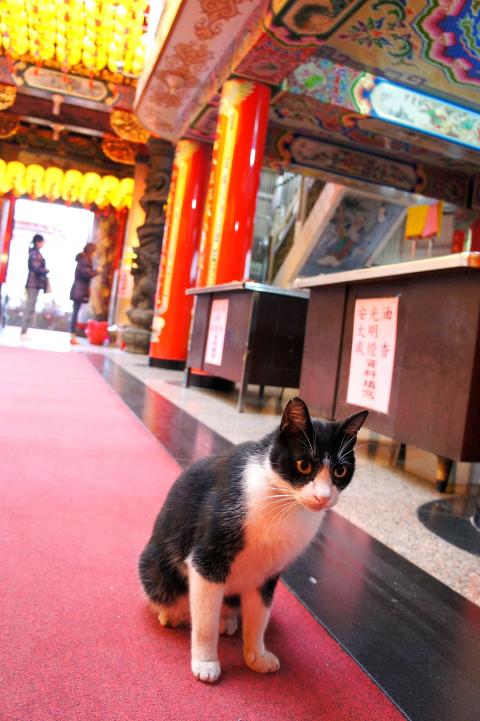A house of worship in New Taipei City’s (新北市) Sanchong District (三重) has become known as the “cat temple” (貓廟) for the friendly cats that reside there, attracting public attention as well as coverage by international media.
At the Yi Tian Temple (義天宮), playful cats leap around the altar, lie on the worshiping cushions and congregate near the temple’s incense altar to warm themselves on a cold day.
According to temple staff, the cats appear to have attained the same spirituality and perceptiveness as the temple’s worshipers, and seem to be listening attentively during the temple’s regular chanting sessions of Taoist and Buddhist texts.

Photo: Lai Hsiao-tung, Taipei Times
The cats also seem to act as hosts, welcoming worshipers by accompanying them through the ritual ceremonies and prayer sessions.
According to the temple’s staff, these 10 pious felines were once stray cats.
The temple is the center of religious worship in the area and it is dedicated to the goddess Matsu.
The front stairway leading to the temple is more than 20m long and several lanterns adorn the front gate. The cats were originally attracted to the temple by these lanterns, temple staff said.
A temple official said the cats stay in the temple due to the kindness of Wang Hsiuh-ying (王秀英), head teacher of the sutra chanting group, who was sympathetic to the plight of stray cats roaming the streets and started feeding them.
Over time, more cats settled in the temple and began treating it as their home, the temple official said.
The felines’ playful behavior has won many people’s hearts and the temple staff have given each of them a name based on their personality, the temple official added.
A worker at the temple said the cats are very tame and friendly, interact with strangers and often rub their body against worshipers’ legs.
He added that when money gets stuck in the slot of the temple’s donation box, the cats sometimes push down the bill with their paw “as if they were the temple’s guardians.”
The worker said that one of the felines was injured in a traffic accident, but after staff hung a protective Matsu amulet around its neck, it recovered from the injury quickly.
He added that a few years ago, a cat named “Niu Niu,” one of the temple’s first felines, went missing.
It was later discovered dead just a short distance from the temple.
Temple staff believe that in her old age, the cat knew she was nearing the end of her life, so she chose to leave the temple quietly for her final departure, a display of its spirituality, the staff added.

A strong continental cold air mass is to bring pollutants to Taiwan from tomorrow, the Ministry of Environment said today, as it issued an “orange” air quality alert for most of the country. All of Taiwan except for Hualien and Taitung counties is to be under an “orange” air quality alert tomorrow, indicating air quality that is unhealthy for sensitive groups. In China, areas from Shandong to Shanghai have been enveloped in haze since Saturday, the ministry said in a news release. Yesterday, hourly concentrations of PM2.5 in these areas ranged from 65 to 160 micrograms per cubic meter (mg/m³), and pollutants were

Taiwan’s armed forces have established response protocols for a wide range of sudden contingencies, including the “Wan Chun Plan” to protect the head of state, the Ministry of Defense (MND) said today. After US President Donald Trump on Saturday launched a series of airstrikes in Venezuela and kidnapped Venezuelan President Nicolas Maduro, concerns have been raised as to whether China would launch a similar “decapitation strike” on Taiwan. The armed forces regularly coordinate with relevant agencies and practice drills to ensure preparedness for a wide range of scenarios, Vice Minister of National Defense Hsu Szu-chien (徐斯儉) told reporters before a

EVA Airways on Saturday said that it had suspended a pilot and opened an investigation after he allegedly lost his temper and punched the first officer several times as their plane was taxiing before takeoff at Los Angeles International Airport. According to a report published on Thursday by The Reporter, the incident occurred after the flight’s Malaysian first officer tried to warn the Taiwanese pilot, surnamed Wen (文), that he was taxiing faster than the speed limit of 30 knots (55.6kph). After alerting the pilot several times without response, the first officer manually applied the brakes in accordance with standard operating

NOT AN OPENING: Trump’s violation of international law does not affect China’s consideration in attacking Taiwan; Beijing lacks capability, not precedent, an official said Taiwanese officials see the US’ capture of the president of Venezuela as a powerful deterrent to Beijing’s aggression and a timely reminder of the US’ ability to defeat militaries equipped with Chinese-made weapons. The strikes that toppled Venezuelan President Nicolas Maduro signaled to authoritarian leaders, including Chinese President Xi Jinping (習近平), US President Donald Trump’s willingness to use military might for international affairs core to US interests, one senior official in Taipei’s security circle said. That reassured Taiwan, the person said. Taipei has also dismissed the idea that Trump’s apparent violation of international law could embolden Beijing, said the official, who was not